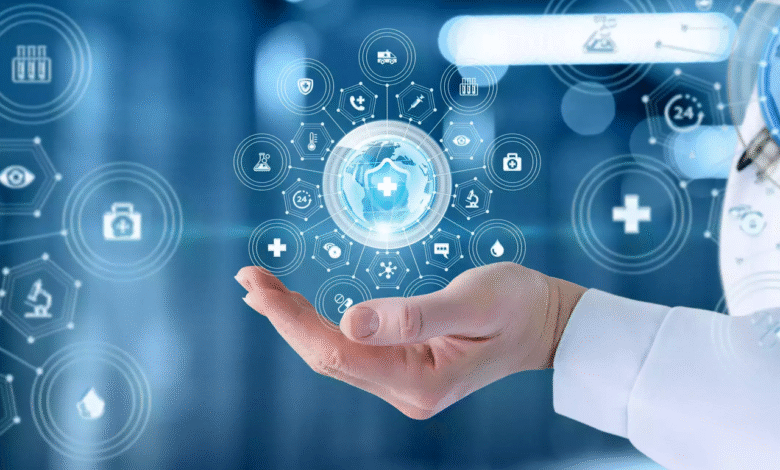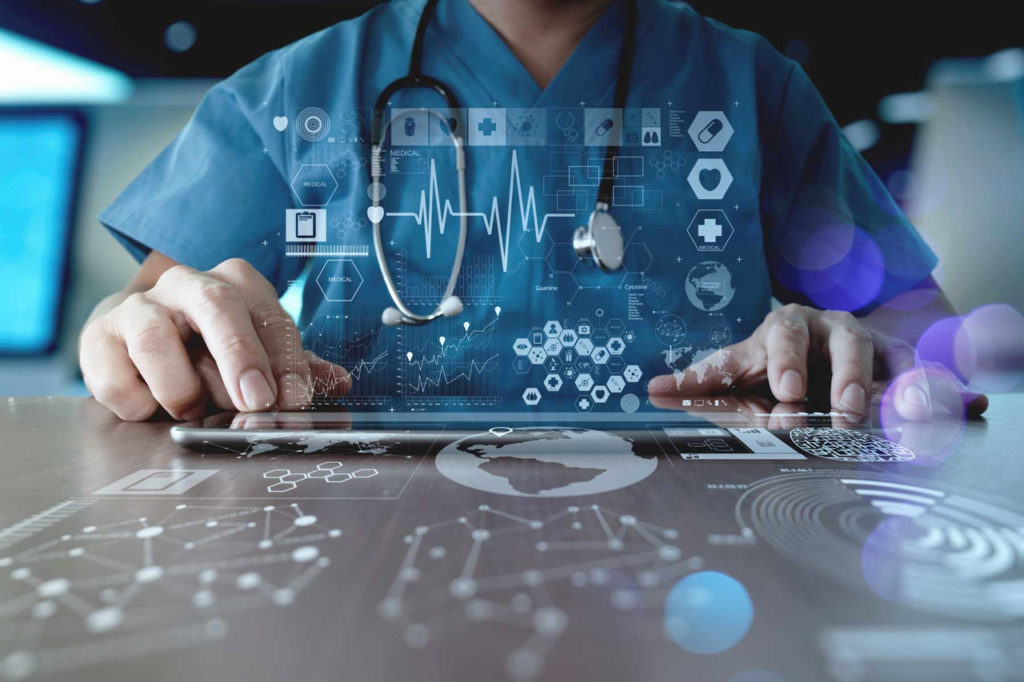
Health technology, or health tech, is a rapidly growing field that encompasses the application of technology to improve healthcare delivery, patient outcomes, and overall wellness. With the advent of innovative technologies, such as artificial intelligence (AI), robotics, and wearable devices, the healthcare industry is experiencing a transformational shift towards more personalized and efficient care.
Read More: AI in Healthcare: Revolutionizing Patient Care
The Impact of Innovation

Innovation in health tech is revolutionizing the way healthcare is delivered and experienced by both patients and providers. By leveraging cutting-edge technologies, healthcare organizations can streamline processes, enhance diagnostic accuracy, and improve treatment outcomes.
Revolutionizing Healthcare Delivery
Traditional healthcare delivery models often face challenges such as long wait times, limited access to specialists, and fragmented care. However, with the integration of telemedicine solutions, these barriers are being overcome. Telemedicine enables patients to consult with healthcare professionals remotely, eliminating the need for in-person visits and providing greater convenience and accessibility.
Enhancing Patient Care
In addition to improving access to care, health tech innovations are enhancing the quality and effectiveness of patient care. Wearable devices, for example, provide individuals with real-time insights into their health and wellness metrics, allowing for proactive management of chronic conditions and early detection of potential health issues. Similarly, AI-powered diagnostic tools are enabling healthcare providers to analyze medical data more efficiently and accurately, leading to faster diagnosis and more personalized treatment plans.
Telemedicine: Breaking Barriers
Telemedicine, also known as telehealth, is a key component of health tech that is revolutionizing the delivery of healthcare services. By leveraging communication technology, telemedicine enables patients to receive medical care remotely, without the need for in-person visits to healthcare facilities.
Convenience and Accessibility
One of the primary benefits of telemedicine is its ability to provide convenient and accessible healthcare services to individuals, regardless of their geographical location. Patients can consult with healthcare professionals from the comfort of their own homes, saving time and reducing the need for travel to medical facilities. This is especially beneficial for individuals living in rural or underserved areas, who may have limited access to healthcare resources.
Remote Monitoring and Management
Telemedicine also facilitates remote monitoring and management of chronic conditions, allowing patients to receive ongoing care and support outside of traditional clinical settings. Through telemedicine platforms, healthcare providers can remotely monitor vital signs, track symptoms, and adjust treatment plans as needed, helping to improve patient outcomes and quality of life.
Wearable Devices: Personalized Health Tech Insights
Wearable devices, such as smartwatches and fitness trackers, are playing an increasingly important role in health tech by providing individuals with personalized insights into their health and wellness.
Fitness Tracking and Wellness Management
Wearable devices equipped with sensors can track various metrics, such as steps taken, heart rate, and sleep patterns, allowing users to monitor their physical activity levels and overall fitness. By setting goals and receiving feedback through wearable apps, individuals are empowered to make healthier lifestyle choices and improve their overall well-being.
Chronic Disease Management
In addition to promoting general wellness, wearable devices are also being used to manage chronic conditions such as diabetes, hypertension, and heart disease. By continuously monitoring vital signs and physiological parameters, these devices can help individuals track their health status in real-time, detect early warning signs of complications, and adhere to treatment plans more effectively.
Big Data and AI: Precision Medicine

Big data and artificial intelligence (AI) are revolutionizing the field of precision medicine by enabling healthcare providers to deliver more personalized and targeted treatments to individual patients.
Predictive Analytics
By analyzing large datasets containing patient demographics, medical history, genetic information, and other relevant data points, AI algorithms can identify patterns, trends, and correlations that may not be apparent to human clinicians. This allows for more accurate predictions of disease risk, early detection of health issues, and proactive interventions to prevent or mitigate adverse outcomes.
Treatment Customization
In addition to predictive analytics, AI-driven algorithms can also assist healthcare providers in customizing treatment plans based on individual patient characteristics, preferences, and responses to therapy. This personalized approach to medicine takes into account factors such as genetic variations, biomarker profiles, lifestyle factors, and environmental influences, allowing for more effective and targeted interventions.
Robotics in Healthcare
Robotic technology is another transformative aspect of health tech that is revolutionizing various aspects of healthcare delivery, from surgical procedures to rehabilitation and assistance for individuals with disabilities.
Surgical Precision and Efficiency
Robotic-assisted surgery enables surgeons to perform complex procedures with enhanced precision, dexterity, and control, leading to better surgical outcomes and reduced risk of complications. By using robotic systems to manipulate surgical instruments with greater accuracy and stability, surgeons can minimize tissue damage, shorten recovery times, and improve patient satisfaction.
Rehabilitation and Assistance
In addition to surgical applications, robotics are also being used in rehabilitation therapy to help individuals recover from injuries, surgeries, or disabilities. Robotic devices can provide customized exercises, assistance with mobility tasks, and real-time feedback to facilitate recovery and improve functional outcomes. This technology has the potential to enhance the quality of life for individuals with physical impairments and promote greater independence and autonomy.
Blockchain: Secure Health Data Management
Blockchain technology offers a decentralized and secure means of storing, sharing, and managing health data, addressing concerns related to data privacy, security, and interoperability.
Interoperability and Data Sharing
One of the key benefits of blockchain in healthcare is its ability to facilitate interoperability and seamless data exchange between different healthcare providers, systems, and stakeholders. By using a distributed ledger system, blockchain enables authorized parties to access and share medical records securely, without the need for intermediaries or centralized control. This improves care coordination, enhances patient safety, and reduces administrative burdens associated with traditional data management methods.
Patient Privacy and Security
Blockchain’s cryptographic techniques ensure that health data remains confidential, tamper-proof, and resistant to unauthorized access or manipulation. Each transaction recorded on the blockchain is encrypted and linked to previous transactions, creating a transparent and immutable audit trail of data activity. This enhances patient trust and confidence in the security and integrity of their medical information, fostering better doctor-patient relationships and promoting greater engagement in healthcare decision-making.
Challenges and Opportunities
While health tech holds immense promise for improving healthcare delivery and patient outcomes, it also presents challenges that need to be addressed for widespread adoption and integration into clinical practice.
Regulatory Hurdles
One of the primary challenges facing health tech is navigating complex regulatory frameworks and compliance requirements. The rapid pace of technological innovation often outpaces existing regulations, leading to uncertainties and barriers to implementation. Healthcare organizations and technology developers must work closely with regulatory agencies to ensure that new technologies comply with applicable laws and standards, while also prioritizing patient safety, data privacy, and ethical considerations.
Integration with Traditional Healthcare Systems
Integrating health tech solutions into existing healthcare systems can be challenging due to a variety of factors, including interoperability issues, workflow disruptions, and resistance to change. Healthcare providers may encounter technical, cultural, and organizational barriers when implementing new technologies, requiring careful planning, stakeholder engagement, and training initiatives to facilitate successful adoption and acceptance. Additionally, the cost of implementing and maintaining health tech solutions may pose financial challenges for healthcare organizations, particularly those operating within constrained budgets or resource constraints.
Future Trends

Despite the challenges, the future of health tech is filled with exciting possibilities and opportunities for innovation. Several emerging trends are poised to further transform the healthcare landscape and improve patient care across the continuum.
Augmented Reality in Surgery
Augmented reality (AR) technology is revolutionizing surgical procedures by providing surgeons with real-time, three-dimensional visualizations of patient anatomy and surgical instruments. By overlaying digital information onto the surgical field, AR systems enable surgeons to navigate complex anatomical structures with greater precision and confidence, leading to improved surgical outcomes, reduced complications, and enhanced patient safety. AR has the potential to revolutionize medical education and training, allowing surgeons to practice and refine their skills in a realistic and immersive virtual environment.
Genomics and Personalized Medicine
Advancements in genomic sequencing and analysis are paving the way for personalized medicine approaches that are tailored to the individual genetic profiles of patients. By analyzing genetic variations, biomarker profiles, and other molecular data, healthcare providers can develop targeted treatment strategies that are customized to each patient’s unique characteristics, preferences, and needs. This personalized approach to medicine holds the promise of improved treatment outcomes, reduced adverse reactions, and enhanced patient satisfaction, ultimately leading to better health outcomes and quality of life.
Read More: Top Collagen Health Benefits for Men
FAQs
- How is telemedicine changing the way healthcare is delivered? Telemedicine allows patients to consult with healthcare professionals remotely, improving access to care and reducing barriers such as distance and time constraints.
- What are some challenges associated with the adoption of health tech solutions? Challenges include regulatory hurdles, integration with traditional healthcare systems, interoperability issues, and concerns about data privacy and security.
- How can wearable devices benefit individuals with chronic diseases? Wearable devices can monitor vital signs in real time, detect abnormalities, and provide early warnings of health issues, empowering individuals to manage their conditions more effectively.
- What role does AI play in precision medicine? AI algorithms analyze large datasets to identify patterns and predict disease risk, enabling personalized treatment strategies based on individual patient characteristics.
- What are some future trends in health tech? Emerging trends include the use of augmented reality in surgery, advancements in genomics for personalized medicine, and the integration of technology to enhance patient engagement and outcomes.
The Final Words
Health tech is reshaping the healthcare industry by leveraging the power of technology to improve patient outcomes, enhance efficiency, and increase access to care. From telemedicine and wearable devices to AI-driven diagnostics and robotic-assisted surgery, innovation in health tech is transforming the way healthcare is delivered and experienced by patients and providers alike. While challenges remain, the future of health tech is bright, with emerging trends such as augmented reality in surgery and genomics-driven personalized medicine poised to further revolutionize the field. By embracing innovation, collaboration, and continuous improvement, healthcare organizations can harness the full potential of health tech to create a healthier, more connected, and more compassionate world.







